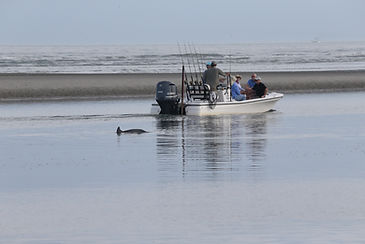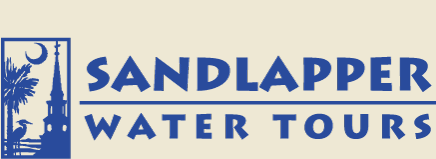

WAVE Workshops
Wildlife Awareness & Viewing Etiquette
Program Description
WAVE, short for Wildlife Awareness & Viewing Etiquette, is a half-day educational workshop led by Lowcountry Marine Mammal Network (LMMN) with the goal to promote responsible boating and viewing etiquette of marine wildlife of South Carolina, with a focus on bottlenose dolphins, sea turtles, and manatees. Two workshops are offered - one geared towards commercial businesses and the other to recreational boaters/general public.
By joining a workshop, you or your business can become WAVE Ambassadors, indicating your commitment to responsible wildlife viewing and marine conservation.

Thursday, Feb 26 (Business & Public) - 11am-2pm
Location: USCB HHI Campus
1 Sand Shark Dr
Hilton Head Island, SC 29928
Light refreshments and pastries will be provided.
Guest speakers include South Carolina CMARI Team/USACE, SCDNR, NOAA Law Enforcement, NOAA National Ocean Service, Coastal Carolina University, &/or Sea Turtle Patrol HHI!
Past Events:
Feb 5 & 7, 2026 - 9am-1pm at MRRI, Charleston, SC
Feb 12, 2026 - 11am-3pm at MB State Park, Myrtle Beach, SC
2026 Workshop Dates
BACKGROUND
South Carolina waters are home to several marine mammal and sea turtle species. Boaters often share the same waterways, creating a dynamic coexistence where responsible boating and viewing practices are essential to minimize the impact on ecosystems and species that inhabit these environments. Tamanend’s bottlenose dolphins (Tursiops erebennus) are the only resident marine mammal in South Carolina year-round. They have ranging patterns extending across the South Carolina coast and within the estuarine systems. In the Charleston area alone, there is a resident population of about 300 dolphins. Despite dolphins being federally protected under the Marine Mammal Protection Act (1972), there have been long-standing issues of human interaction towards these dolphins, with boat strikes and entanglements in marine debris being common causes of mortality. The illegal feeding, touching, and harassment from commercial and recreational boaters also continues to be a source of disturbance to local dolphins. Dolphins that engage in strand feeding, a rare foraging strategy, face greater levels of disturbance as this behavior happens near shorelines. NOAA has documented incidents of people, both from land and vessel/kayak, trying to interact with or feed dolphins during strand feeding. People have also been reported for trying to grab, jump, or stand on the animals. Human interaction with marine mammals can cause disturbance towards the animals. Studies have shown that human disturbance, especially the presence of tour vessels and other watercraft, can lead to a decline in dolphin abundance in that area or can cause them to change and/or stop their normal foraging behavior. Other critical behaviors, such as maternal care and resting are also particularly vulnerable to disturbance. In addition to marine mammals, sea turtle populations are also at risk due to the result of human activities. Four species of sea turtles (loggerhead, Kemp's ridley, green and leatherback) can be found in South Carolina's near shore waters April through November, or nesting on our beaches from May through October. Sea turtles face significant threats including accidental capture in commercial fisheries, nesting site disturbance, and collisions with boats, all of which jeopardize their reproductive success and overall population health.
_JPG.jpg)


Mission & Goals of WAVE
LMMN has launched the WAVE Workshop in response to the above issues with the mission to promote awareness and responsible viewing of dolphins and other marine wildlife of South Carolina and reduce instances of disturbance and harassment.
Goals of the Workshop Include: 1.) Species Identification: Learn to identify the various marine mammals, including bottlenose dolphins, sea turtle species, and right whales found in South Carolina's coastal waters. Understand their behaviors, habitats, and significance in the local marine ecosystem 2.) Increase Conservation Awareness: Explore the unique conservation challenges faced by marine mammals and sea turtles in South Carolina, including boat and fishing-related threats, and the impact of human activities on their populations 3.) Responsible Viewing Guidelines: Gain insights into responsible viewing practices that minimize harassment to marine life and learn to identify signs of disturbance. Understand the importance of responsibly viewing wildlife from boats, from land, and from the air 4.) Gain Familiarity with Legislation & Regulations: Get to know the existing legislation and regulations in South Carolina aimed at protecting marine mammals and sea turtles. Learn how compliance contributes to the preservation of these species 5.) Understand the Role of Advertising in Responsible Tourism: We discuss the role of advertising in promoting responsible wildlife viewing for eco tour focused businesses. Learn how you can advertise for your business in ways that don't promote engaging with wildlife or may lead to disturbance or harassment. For the general public workshop, we teach how responsible tourism choices can impact wildlife on a local and global scale Q & A sessions are offered at the completion of each workshop. Have your questions answered by marine biologists and conservation experts. Guest speakers may include NOAA National Ocean Service scientists, sea turtle experts, Right Whale flight observers, Coastal Carolina Scientists, and NOAA Law Enforcement. Gain valuable insights into specific issues related to marine mammals and sea turtles in South Carolina
Values of Being a WAVE Ambassador
Recognition
Receive a certification for you or your business indicating you successfully completed the workshop and are proud WAVE Ambassadors
Collab & Advertise
Your business will be featured on LMMN’s website as being a WAVE Ambassador & recognized on our social media (59,000+ followers) showcasing your dedication to marine conservation
Exclusive Resources
Receive exclusive outreach material, merchandise & access to current research findings by experts in the field. For businesses, this will provide a competitive edge in offering unique and informed wildlife experiences
Community
Facilitate networking opportunities with other companies, conservation organizations, & experts in the field. Networking can lead to collaborations, shared best practices, & a sense of community within the industry. Join the Facebook group for WAVE Ambassadors for continued networking & communication.
WAVE Ambassadors
LMMN is proud to support the following businesses as WAVE Ambassadors who are committed to marine conservation and the responsible viewing of wildlife in coastal South Carolina:
Click on each picture to be directed to their website & book a tour!
Charleston

Hilton Head & Beaufort
.png)

.png)














.png)
.jpeg)





.jpeg)

.png)





.jpg)
.jpg)
